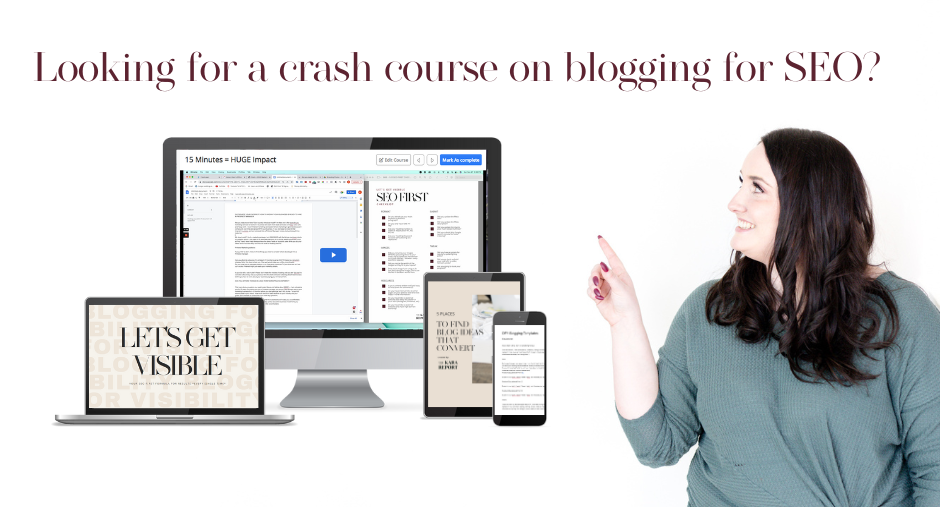How should you come up with blog ideas? That’s one of my most frequently asked questions. People either say, “I have so many ideas, I can’t get my thoughts out,” or “I sit at a blank screen with no idea what to blog about.” After doing this for four years, I have a system.
It can be challenging, but I have tricks and tips for finding blog ideas, choosing the right ones, positioning them to attract your ideal client, hopping on trends, and more! Let’s get into it.
Listen on Apple | Listen on Spotify
Table of Contents
So, Where Do We Start?
Before I go through my steps, here’s my dose of encouragement for you. It’s easy to get stuck in analysis paralysis mode. If you have four ideas, write all four. The order doesn’t matter. Just start and get things out into the world. Momentum creates more momentum. This is a theme I’m learning repeatedly as a business owner. If you just get started, the next steps appear. While I’ll walk you through the steps I personally take next, I want to say I feel this is best practice. It doesn’t mean you’ll never rank on Google if you don’t follow every step I break down for you today or write every blog post perfectly.
I knew nothing when I started my destination wedding planning blog seven years ago. I was learning from the school of Google and had zero experience. I didn’t follow best practices, especially looking back and revitalizing older blog posts. It’s important to remember we put a lot of pressure on ourselves. At some point, it’s better to just get things out there.

Re-Purpose Previous Content for Fresh Blog Ideas
The first thing I recommend is rounding up content you’ve already created on other platforms. If you have a podcast or YouTube channel, look there for content to repurpose. As an aside, one of my favorite services is turning podcast episodes into blog posts. If you’re looking to hire this out, it’s my favorite thing to do.
Basic show notes are a missed opportunity. By basic, I mean a paragraph or two about the episode on your website. Blog posts for podcast episodes can rank well. At my six-month mark of podcasting, I realize creating a podcast is a lot of work. We put ton of effort into this, so not getting as much out of each episode as possible is bananas. 10 out of 10 recommend.
The second thing is to peruse your Instagram content. Look at carousels and long captions. What content could you repurpose on your blog? It’s a great place to start. I’ve had clients take lessons from their courses. If you have a membership with monthly videos, it’s easy to take bits from a call, an answer to a question in office hours, or a lesson. You’re not giving everything away, but creating a blog post can upsell your course. Like, “This blog post came from my course. Buy the whole thing to learn more.”
I know we don’t all have a ton of content. Maybe you’ve made big pivots and don’t have much to repurpose. No problem. But that’s where I always start.
Head to Keywords to Find Blog Ideas
1. Create a List of Keywords
I usually take my main keyword to SEMrush, my SEO tool. I’ve used Ahrefs and Ubersuggest in the past. Ahrefs and SEMrush are pricier tools, around $150 to $200 US dollars a month. Ubersuggest is free to $29 a month. I used Ubersuggest for a long time and wish I had upgraded to a more expensive tool earlier. If I had known how much better it was, I would’ve done that sooner.
I know you’re not supposed to say this; you’re supposed to say you don’t need a paid tool, free tools are enough. That’s the common narrative. But I wish someone had told me how much better and easier my life would be with a paid tool. So I’m saying it.
Regardless of your tool, I like to come up with keywords and phrases I hear from ideal clients, see in inquiry forms, or in Facebook group comments. Even starting with a general idea works. For example, if you’re a website designer wanting to write about modern website design, type that keyword into your SEO tool and check related keywords. Put them all on a spreadsheet or doc.
2. Look at Trends
I also like to look at trends, which can help get found more quickly. SEO is a long game, but hopping on trends can rank quickly. I examine both Pinterest Trends and Google Trends as they complement each other and are free tools. Type in your industry and relevant keywords. For my business, I wouldn’t just search “marketing,” but might look up “blogging,” “Pinterest marketing,” “course creation,” “online courses,” then target clients like business coaches or website designers. I explore different facets of my services and potential client types to see what’s trending.
Avoid being too specific in these trend tools. For example, in the wedding industry, “moody romantic table decor” might be too specific. Instead, look for broader terms like “timeless wedding style” or “romantic wedding style,” then drill down from there. We’re often told to go niche, but sometimes we go too niche, and the trend features won’t give good ideas.
3. Google Alerts
Google Alerts is another free tool for generating blog ideas and tracking industry trends. Set up Google Alerts to email you daily or weekly with top new content according to certain keywords. For example, I use alerts for “Pinterest marketing,” “blogging,” and “SEO tips.” While I don’t always check them, they are useful for seeing what people are talking about and generating ideas. If something catches my eye, I dig deeper into it.
Ask ChatGPT for Blog Ideas
Now we should have many ideas. If not, head to ChatGPT and say, “I am [your title]. I’m looking for 20 blog topics geared toward [your target audience]. Be specific in your prompt. You may only have one idea and ChatGPT will give you even more similar ideas that could all be targeting different keywords. This can spark ideas you never thought of.
Keyword research tools are often recommended, but if you have no starting point, they’re not helpful. You need to type in a word to research it, and without ideas, what is that word supposed to be?
How to Use Our Keywords and Turn it Into Blog Ideas
Okay, so now we have a ton of keywords, but how do we turn those keywords into blog ideas? Typically, we need to give it some sort of angle or content tailored to our ideal clients.
For example, let’s say you are a wedding venue, and your keyword is “how to create a wedding floor plan.” You could angle that as “Eight Tips for Creating a Wedding Floor Plan,” “How to Set Up Your Wedding Floor Plan,” or “Unique Wedding Floor Plan Ideas.” I also encourage considering the season. During engagement season, you might write “Questions to Ask Your Wedding Venue About Their Floor Plan.” In the spring, when people are finalizing wedding details, you could go with “Five Tips for Setting Up Your Bar and Dance Floor to Keep the Dance Floor Packed.”
Take a keyword and think of different angles to attract people. If you’re local, use your city in the title, like “A Guide for New York City Couples” or “The Best California Wedding Floor Plans We’ve Seen at Our Venue.” It’s not just about getting on Google but also about getting people to book you. What’s going to make your blog posts stand out among others targeting the same keyword? And now we have to compete with AI responses.
For instance, as a website designer, a post like “How to Update My Footer in Showit” might eventually be AI-generated. But something like “How to Use Your Website Footer to Get More Sales” or “Eight Things People Should Include in Their Footer but Don’t” would grab my attention. General topics like “How to Create a Wedding Budget in Excel” might be AI content, but “What Most People Miss in Their Wedding Budget,” “How to Manage Cashflow Beyond a Simple Wedding Budget,” or “My Biggest Tips for Managing Your Wedding Budget as a Wedding Planner” are more engaging.
These topics are juicier and better heard from a real person rather than a generic AI response. Also, consider where you are booked in the wedding planning process. If you’re selling chocolates as wedding favors, you can target topics from engagement to the wedding day. But if you’re a wedding photographer, writing about “The Top Wedding Favors” or a “Last Minute Wedding Checklist” isn’t relevant because your services are booked early in the planning process. Keep this in mind when creating your content.
What to Do if You Have a Ton of Blog Ideas
All of these previous tips were tailored to people who are just staring at a blank screen or deciding which one to do next. I want to clarify and address what to do if you have a ton of ideas. So, during your keyword research you should be validating the ideas you have. This is when you should cross off any that have super high competition or super low search volumes.
All Blog Ideas Won’t Rank on Google (And That’s Okay!)
Okay, that felt like a lot, so let’s quickly recap: first, look at the content you already have. Second, round up the keywords. And third, find ways to tailor the keywords to attract people who are actually going to book and need what you offer. Now, you have really good (profitable) blog ideas.
What I want to close with is the reality that the number of blog posts you write will always be greater than the number of posts that rank on page one and make you money. Not every post you write will rank on Google, and you shouldn’t expect it to. Trying to come up with perfect topics and tracking them obsessively can stop you from taking action. It’s just not effective, so let go of that expectation.
It’s okay for a few reasons. First, it’s still valuable content for people who land on your website through other means. Second, it supports your overall Google ranking by showing you as an authority. Google likes sites that update regularly and have fresh content. Even if a blog post isn’t ranking, it might push the ones that are bringing you clients further up or keep them at the top.
Finishing Up: Check Out My Blogging Mini Course!
If you want to dive deeper into this, I’d love for you to sign up for my mini course, Blogging for Bingeable Brands (use code PODCAST20 for 20% off!). I break down everything you need to know about the logistics and getting on Google. My mini course is designed to be completed in less than an afternoon! And the last video walks you through everything you’ve learned so you can see that it takes less than 15 minutes to implement. Ensuring your blog posts are optimized for Google without wasting your time.
Anything is better than nothing, so don’t let the fear of not doing it perfectly stop you from starting. Hopefully, this gives you some ideas for coming up with blog topics. If you’d like to take this further, I’d love to see you inside the course!
LINKS MENTIONED
- Listen to my episode on The Calligraphy Biz Corner: listen on Apple // listen on Spotify
- Hire us to write SEO-driven blog posts for you
- Join Blogging for Bingeable Brands (Use Code PODCAST20 for 20% Off!)
- Learn more about working with our marketing agency here
- Follow me on Instagram
